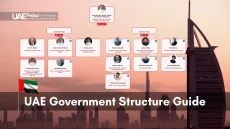The UAE’s system of checks and balances is key to its government’s accountability. How does a nation known for fast growth and modern cities keep control and democracy? The UAE is ranked first in the MENA region for the ‘Rule of Law’ 2022 Index.
This shows the UAE’s strong commitment to fair rules, justice for citizens, and law enforcement. It sets a high standard for good governance in the area.
The UAE Political Structure balances tradition with progress, ensuring fair governance.
Constitutional Framework and Legal Foundations
The UAE Constitution is the heart of the United Arab Emirates’ government. It sets up the government and protects people’s rights in the seven Emirates. Let’s look at its main points and how it shapes the law in this Gulf nation.
Role of the UAE Constitution in Establishing Government Authority
The UAE Constitution splits power into three parts: the law makers, the leaders, and the judges. This setup helps keep everyone in check. It makes sure no one has too much power.
Fundamental Legal Principles and Rights Protection
The Constitution says everyone is equal under the law and can’t be discriminated against. It also protects freedoms like moving around, speaking your mind, and believing what you want. These rights are for both locals and visitors, following global standards.
Integration of Islamic Law and Modern Governance
The UAE’s law is special because it mixes Islamic law with modern rules. Sharia is a big part of the law, but it also follows civil law. This mix respects the culture while meeting global needs.
| Aspect | Islamic Law Influence | Modern Governance Adaptation |
|---|---|---|
| Legal Source | Sharia positioned as main source in Constitution | Implementation of international arbitration standards in Free Zones |
| Commercial Principles | Riba and gharar concepts applied | Adaptation to modern contract laws |
| Inheritance | Islamic rules enforced by Dubai Courts | DIFC Foundations Law consideration |
UAE Checks and Balances: Implementation and Oversight
The United Arab Emirates (UAE) has a strong system to keep the government in check. This system is based on the UAE’s laws and constitution. The UAE Constitution says justice is key to good governance, with judges making decisions on their own.
The UAE has five main government bodies. The Federal Judiciary is very important in this system. It has the Federal Supreme Court and local courts in each emirate. This helps keep the government balanced and fair.
The Federal Supreme Court is the top court in the UAE. It checks if laws are fair and solves problems between emirates. Its decisions are final, making sure the government is accountable. The Ministry of Justice helps by managing courts and lawyers, making the system stronger.
The UAE is also using new technology to improve its government. It wants to be a leader in AI by 2031. The “UAE Strategy for Artificial Intelligence” started in 2017. It aims to make the government work better with AI, which could change a lot of jobs.


















